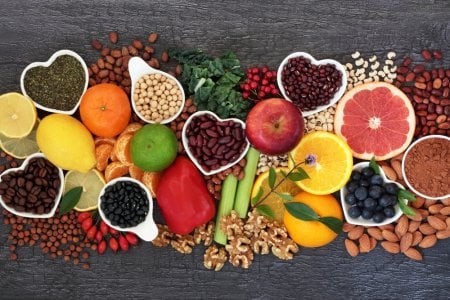This Ignored Nutrient in Your Diet Could Slash Your Colon Cancer Risk by 33% - Are You Missing Out?
By
Seia Ibanez
- Replies 6
When it comes to diet and health, we often hear about the importance of macronutrients like carbohydrates, fats, and proteins. However, there's an unsung hero in the nutrition world that deserves our attention, especially for those of us over 60 who are increasingly mindful of our health: dietary fiber. Recent research has highlighted the significant role fiber plays in reducing the risk of colon cancer, a concern that's particularly relevant for our age group.
A study has found that consuming just 24 grams of fiber daily – roughly equivalent to five servings of fruits and vegetables – can lower the risk of colon cancer by an impressive 30 percent. Yet, despite this compelling evidence, many people fall short of the recommended 30 grams of fiber per day. This shortfall is concerning, as it may contribute to the rising incidence of colorectal cancer, especially among younger adults.
The graph below illustrates the alarming increase in colon cancer rates among adults aged 20 to 49, with over 40 percent of diagnoses occurring in those aged 45 to 49. This trend underscores the need for dietary vigilance across all age groups.
Fiber's benefits extend far beyond cancer prevention. As a type of carbohydrate that the body cannot fully digest, fiber plays a crucial role in maintaining digestive health, preventing constipation, and controlling 'bad' LDL cholesterol levels. It also helps regulate blood sugar by slowing the release of sugar into the bloodstream, which can prevent spikes that lead to type 2 diabetes, inflammation, and weight gain.
While some may shy away from increasing their fiber intake due to concerns about gas and bloating, the advantages of fiber far outweigh these minor discomforts. Fiber is essential for a healthy gut microbiome, as it's broken down into metabolites that energize colon cells and prevent inflammation – a key precursor to cancer.
Moreover, fiber aids in weight management by slowing digestion and absorption of nutrients, which keeps you feeling full longer. It also adds bulk to your meals without extra calories, helping to signal to your brain that you're satisfied.
The anti-cancer properties of fiber are supported by a wealth of research. A 2010 Oxford University study reported a 30 percent reduction in colorectal cancer risk for those consuming an average of 24 grams of fiber per day. A 2011 analysis in the British Medical Journal found that for every additional 10 grams of fiber in one's diet, the risk of colorectal cancer drops by 10 percent.
Dr. Suneel Kamath, a GI oncologist at the Cleveland Clinic, emphasizes the importance of a fiber-rich diet in preventing colorectal cancer. The diet's impact on the gut microbiome is significant; when low in fiber, gut bacteria produce harmful metabolites that can contribute to cancer development.
Foods high in fiber include fruits like apples, bananas, and berries; vegetables such as carrots, broccoli, and spinach; whole grains like brown rice and oatmeal; legumes including beans and lentils; and nuts and seeds like almonds and chia seeds.
For those looking to increase their fiber intake, consider starting your day with a fiber-rich breakfast of bran cereal, grapefruit, and whole grains. Lunch and dinner can include whole wheat bread, salads, baked potatoes with skin, and plenty of vegetables.
The average American diet, heavy in processed foods and red meat, typically contains only about 15 grams of fiber per day. With colorectal cancer diagnoses on the rise in younger adults, it's more important than ever to prioritize fiber in our diets.

As we age, the stakes for maintaining our health only get higher. Incorporating more fiber into our meals is a simple yet powerful way to protect ourselves against serious health issues like colon cancer. So, let's not overlook this crucial nutrient – our bodies will thank us for it. Share your favorite high-fiber recipes or tips for increasing fiber intake in the comments below, and let's help each other live healthier, longer lives.
A study has found that consuming just 24 grams of fiber daily – roughly equivalent to five servings of fruits and vegetables – can lower the risk of colon cancer by an impressive 30 percent. Yet, despite this compelling evidence, many people fall short of the recommended 30 grams of fiber per day. This shortfall is concerning, as it may contribute to the rising incidence of colorectal cancer, especially among younger adults.
The graph below illustrates the alarming increase in colon cancer rates among adults aged 20 to 49, with over 40 percent of diagnoses occurring in those aged 45 to 49. This trend underscores the need for dietary vigilance across all age groups.
Fiber's benefits extend far beyond cancer prevention. As a type of carbohydrate that the body cannot fully digest, fiber plays a crucial role in maintaining digestive health, preventing constipation, and controlling 'bad' LDL cholesterol levels. It also helps regulate blood sugar by slowing the release of sugar into the bloodstream, which can prevent spikes that lead to type 2 diabetes, inflammation, and weight gain.
While some may shy away from increasing their fiber intake due to concerns about gas and bloating, the advantages of fiber far outweigh these minor discomforts. Fiber is essential for a healthy gut microbiome, as it's broken down into metabolites that energize colon cells and prevent inflammation – a key precursor to cancer.
Moreover, fiber aids in weight management by slowing digestion and absorption of nutrients, which keeps you feeling full longer. It also adds bulk to your meals without extra calories, helping to signal to your brain that you're satisfied.
The anti-cancer properties of fiber are supported by a wealth of research. A 2010 Oxford University study reported a 30 percent reduction in colorectal cancer risk for those consuming an average of 24 grams of fiber per day. A 2011 analysis in the British Medical Journal found that for every additional 10 grams of fiber in one's diet, the risk of colorectal cancer drops by 10 percent.
Dr. Suneel Kamath, a GI oncologist at the Cleveland Clinic, emphasizes the importance of a fiber-rich diet in preventing colorectal cancer. The diet's impact on the gut microbiome is significant; when low in fiber, gut bacteria produce harmful metabolites that can contribute to cancer development.
Foods high in fiber include fruits like apples, bananas, and berries; vegetables such as carrots, broccoli, and spinach; whole grains like brown rice and oatmeal; legumes including beans and lentils; and nuts and seeds like almonds and chia seeds.
For those looking to increase their fiber intake, consider starting your day with a fiber-rich breakfast of bran cereal, grapefruit, and whole grains. Lunch and dinner can include whole wheat bread, salads, baked potatoes with skin, and plenty of vegetables.
The average American diet, heavy in processed foods and red meat, typically contains only about 15 grams of fiber per day. With colorectal cancer diagnoses on the rise in younger adults, it's more important than ever to prioritize fiber in our diets.
Key Takeaways
- Dietary fibre is increasingly recognized for its significant health benefits, including a 30 percent lower risk of colon cancer when consumed at a rate of 24 grams per day.
- The majority of Americans consume less than the recommended amount of dietary fibre, potentially contributing to the rise in colorectal cancer cases among younger adults.
- Eating a fibre-rich diet can improve digestive health, regulate blood sugar levels, and reduce the risk of diseases such as heart disease, type two diabetes, and certain cancers.
- With colorectal cancer rates rising, particularly among younger adults, health experts emphasise the importance of maintaining a diet high in fibre, alongside regular cancer screening starting at age 45.
As we age, the stakes for maintaining our health only get higher. Incorporating more fiber into our meals is a simple yet powerful way to protect ourselves against serious health issues like colon cancer. So, let's not overlook this crucial nutrient – our bodies will thank us for it. Share your favorite high-fiber recipes or tips for increasing fiber intake in the comments below, and let's help each other live healthier, longer lives.








